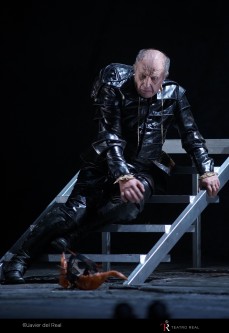 Spain Verdi, Rigoletto: Teatro Real Orchestra and Chorus, Nicola Luisotti (conductor), Teatro Real, Madrid, 2 & 3.12.2015. (JMI)
Spain Verdi, Rigoletto: Teatro Real Orchestra and Chorus, Nicola Luisotti (conductor), Teatro Real, Madrid, 2 & 3.12.2015. (JMI)

Production:
Direction: David McVicar (original)/ Justin Way (revival)
Sets: Michael Vale
Costumes: Tanya McCallin
Lighting: Paule Constable
Casts:
Rigoletto: Leo Nucci/Luca Salsi
Gilda: Olga Peretyatko/Lisette Oropesa
Mantova: Stephen Costello/Francesco Demuro
Sparafucile: Andrea Mastroni
Maddalena: Justina Gringyte/Barbara Di Castri
Monterone: Fernando Radó
Marullo: Alex Sanmartí
Borsa: Gerardo López
Giovanna: María José Suárez
Count Ceprano: Tomeu Bibiloni
Countess Ceprano: Nuria García Arrés
After six years, Rigoletto has returned to Madrid’s Teatro Real. At that time there were four different casts, but one mostly remembers the performance by Leo Nucci, who encored “La Vendetta” ̶ the first time that this had happened since the Teatro Real reopened in October 1997. I might add: is there any opera lover who remembers a performance of Rigoletto with Leo Nucci where there was not an encore of “La Vendetta”? There was one at this 2015 performance as well, even though the audience was not hugely enthusiastic.
This production premiered in London in 2001 and has been revived several times. It’s by David McVicar, one of today’s most prestigious directors, but I found little of interest in the staging. I think one of the reasons for the production’s relative longevity is the fact that it’s eminently traditional and also inexpensive. There’s a revolving stage with a simple inclined façade on one side, which serves as the Duke’s palace. On the opposite side is Rigoletto’s house, which also serves ̶ with some changes ̶ as Sparafucile’s. The lighting is excellent.
The stage direction narrates the plot properly but without any particular originality. I’ve praised Mr. McVicar’s work in the past, but not on this occasion. The first scene is particularly disappointing. It’s fine to portray the court of the Duke of Mantua as depraved, but there are subtle and imaginative ways to depict this without falling into vulgarity and bad taste. There’s just too much sexual activity and too many naked extras on stage.
Rigoletto demands the appropriate musical director, and we had him on the Teatro Real podium. Nicola Luisotti (currently the musical director of opera companies in San Francisco and Naples) has shown a particular affinity and familiarity with Verdi’s score. He’s an excellent conductor in this repertoire, and there was always dramatic tension, care for detail, strong support of the singers and outstanding rhythm. Under his baton both the orchestra and chorus did an excellent job.
There’s no doubt that the main attraction was Leo Nucci as Rigoletto. After almost 40 years in the role and some 500 performances, he identities totally with the character. But even at his best, Nucci’s voice has never been extraordinary when compared to other great Rigolettos such as Cappuccilli or Bruson, to mention only the most recent interpreters.
Nucci has always done and continues to do his own Rigoletto, without showing much interest in the director’s ideas. In this case it was very clear: he got rid of the props that David McVicar gives to the jester and simply offered the Rigoletto we’ve seen from him so often in the past. It has been two years since I last saw him in this role, and I noticed that he now has a marked vibrato and his low notes – which were never strong – are weaker. He also avoided some traditional high notes, which had never happened in my experience. But his Rigoletto still remains a highlight and, as always, he encored “La Vendetta.”
In the second cast, Luca Salsi was Rigoletto. His voice is suits the part and he’s a fine singer, although he sometimes pushes, especially when the tessitura goes upwards. I found his insistence on cutting almost all the traditional high notes surprising.
Soprano Olga Peretyatko was a remarkable Gilda, particularly in Acts II and III. But I found Ms. Peretyatko less convincing than Lisette Oropesa in Act I, particularly in “Caro nome,” where Ms. Oropesa was perfect. Things reversed themselves in the later acts, and the darker color of Olga Peretyatko’s voice was better-suited to the character. She was outstanding in the final act.
Francesco Demuro as the Duke of Mantua in the second cast had both strengths and weaknesses. He has an attractive voice, a truly remarkable technique and exemplary diction, but his voice is somewhat limited in the middle and narrows in the high notes. He has the top notes, even the D flat, but it’s not enough to raise enthusiasm in the audience. Stephen Costello in the first cast was disappointing. His only improvement over Francesco Demuro is the fact that his middle range is a little wider. Everything else (phrasing, diction, elegance and high notes) falls short. His high D does not exist and his B flat is too tight.
Andrea Mastroni was a satisfying Sparafucile. Justina Gringyte did well in the part of Maddalena, better than Barbara Di Castri in the second cast.
The secondary characters were well covered.
Jose M. Irurzun
